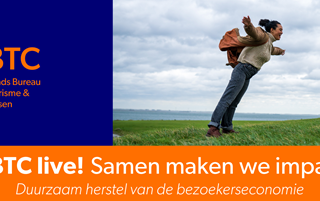
-
 publication: 25 april 2022
publication: 25 april 2022
‘NBTC live’ on April 19, 2022
A brief report

How would the Netherlands look like as a tourism destination five years from now?
This was the central question of ‘NBTC live!’, an event organized by NBTC on April 19, 2022, in The Hague. AIHR professor Elena Cavagnaro was invited ot join because the first steps of the Roadmap for The Netherlands as a Sustainable Tourism Destination would be presented. Elena is a member of the team preparing the Roadmap.
Hereby a brief report of the main messages shared during the event.
The goals of NBTC for next years are ambitious. NBTC wishes to make impact on several domains, including the reduction of the tourism environmental impact and keeping the competitive position of the Netherlands as a tourism destination. Sustainability is seen as a precondition for keeping the Netherlands as a competitive tourism destination now and in the future, and for attracting guests and visitors that see tourism as a way to enrich their life and an opportunity to meet the host community and understand (and enjoy) its traditions.
Although the goals are ambition, NBTC recognizes that the sector is still confronted with several challenges in the recovery after COVID 19. The lack of personnel and inflation were named as the main ones. Due to both, costs of operations are rising, and the issue is how much of these costs can be borne by a sector that is still recovering or should at least partially be passed on to the guests. Yet, - in the words by Marijke Schreiner of Stayokay - sustainability should remain high on the agenda and both staff and guests should be helped in engaging with the UNSDG.
The next speaker was Karlo van Dam, from the Ministry of Economic Affairs and Climate. He stated that the government acknowledges the importance of the sector for the Dutch economy on one side and on the other shared that there is no dedicated budget for the challenges that the sector experiences, including the implementation of the NBTC impact goals. This mixed message was softened by the promise to press the Ministry to release some budged to face the big challenges the hospitality and tourisms sector is confronted with.
Among these challenges van Dam particularly pointed at climate change. He insisted that 2030 is coming nearer and nearer and that we need to choose for socially and environmentally sustainable tourism now to meet the goals of the Paris Agreement. In other words: the urgency of sustainable development is felt at the level of the Ministry and the Ministry is ready to take the lead in the process, if needed through laws and regulations. Van Dam acknowledged that although we all agree to the end-goal of Climate Action, implementation may be more painful for the one actor compared to the other. Yet, he concluded, this should not become an excuse for not acting.
To illustrate how NBTC will achieve its impact goals, two programs were highlighted, data and sustainability.
Menno Stokman (director of the Centre of Expertise in Leisure, Tourism and Hospitality, CELTH) was on the podium to present the project around data. He reminded the audience of the necessity to involve Universities of Applied Sciences to solve the challenges ahead. Essential is not only to connect different stakeholders who already gather data but also to disclose data in a way that is meaningful for the user. Increasing the availability and comparability of (regional) data is one of the goals of the cooperation between CELTH and NBTC alongside the development of the right indicators to measure social impact beyond the residents’ sentiment.
On a critical note, looking at what is suggested to measure on the environmental dimension I missed several of the planetary boundaries i.a. biodiversity loss.
Last but not least, Karina Pool from Merk Fryslân was on the podium together with Ewout Versloot from NBTC to present on the NBTC sustainability impact goals and the Roadmap for The Netherlands as a Sustainable Tourism Destination. Karina showcased how Friesland is implementing the UNSDG in tourism development in cooperation with Circular Fryslân. Ewout shared the first steps that were taken to develop the Roadmap and presented it as an accelerator for all stakeholders but particularly governments at all levels, destination managers, and tourism businesses toward sustainable tourism development in the Netherlands.
In short, as the under title of the NBTC live event read, let us all work together toward a socially, environmentally, and economically sustainable tourism recovery. Because this is the type of tourism that we wish to see in the Netherlands.
Elena Cavagnaro
UAS professor of sustainability in hospitality and tourism




 Back to overview
Back to overview

